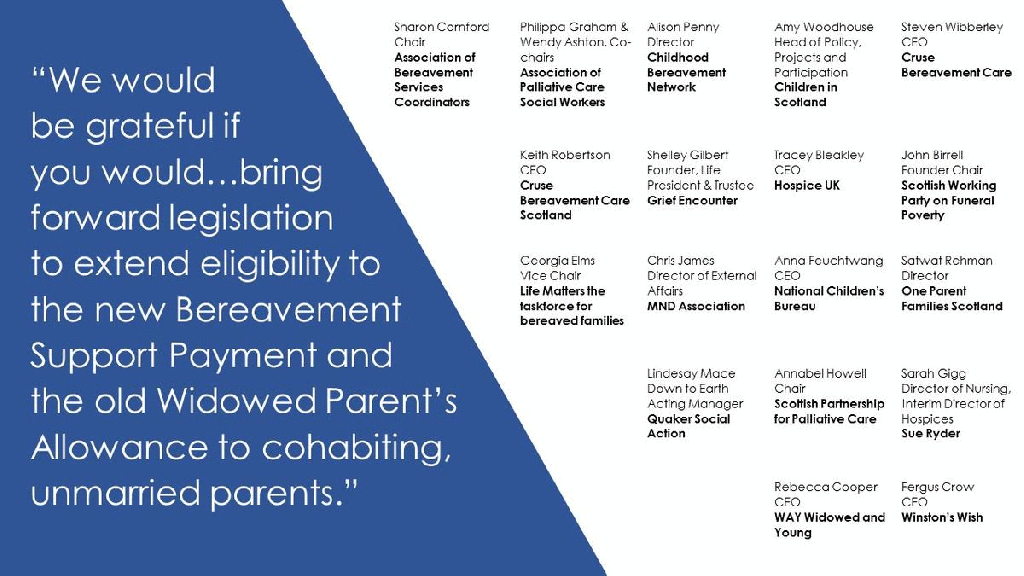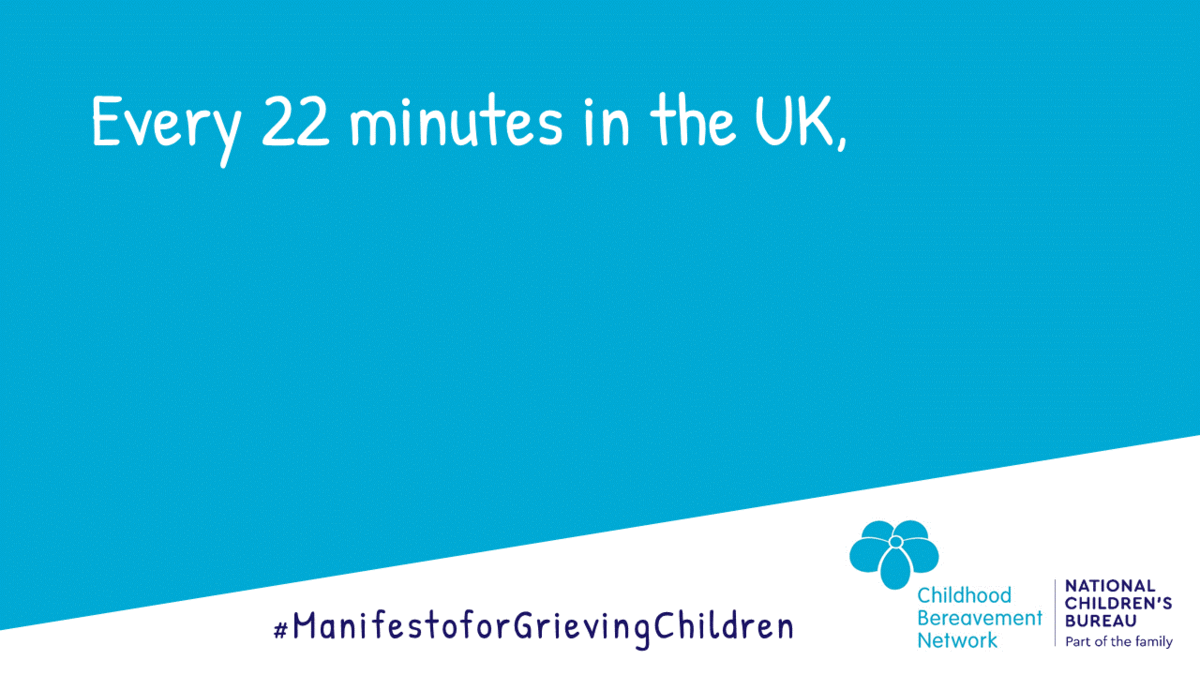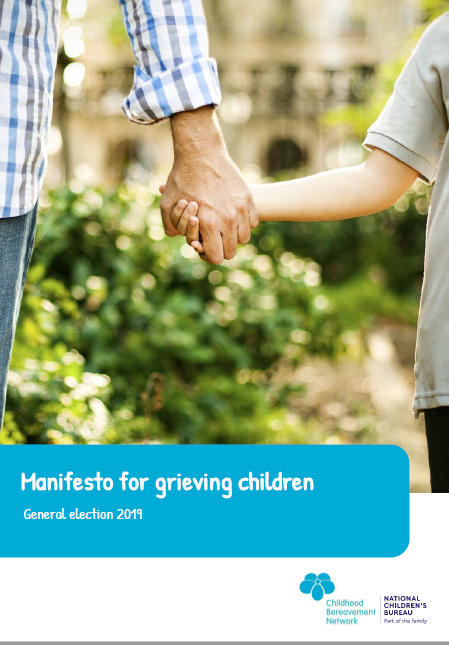- 90% widowed parents say that feelings of loneliness or isolation have been more of a problem for them during the pandemic
- 80% report more loneliness or isolation among their grieving children
- Children’s Grief Awareness Week runs 19-25 November 2020
- Children’s grief charities encourage everyone to #SayTheWords and reach out to ask for and offer support
A survey of over 350 widowed parents conducted for Children’s Grief Awareness Week, reveals the extra struggle faced by grieving families during the pandemic and their urgent need for better support.
The survey, carried out by the Childhood Bereavement Network, shows that 90% of parents whose partner had died in the last ten years, said the pandemic had deepened their feeling of loneliness and isolation.
Three quarters (77%) of widowed parents said the pandemic had made it harder to cope with their grief. Three in five (62%) said it was more difficult to talk to their family and friends about their bereavement, and 77% reported more problems with feeling depressed, since Covid-19 struck.
Grieving children and young people have also found the pandemic hard to cope with: 80% of widowed parents said their children had struggled more with isolation and loneliness during the pandemic, and 79% reported that their children have had more of a problem with worry and anxiety.
With this level of need, it’s crucial that families know where to turn. Children’s Grief Awareness Week runs 19-25 November 2020 and is a chance to increase awareness of the support available for bereaved families.
This year, the theme is #SayTheWords, encouraging families to reach out for support for themselves and their children, and inviting friends, schools, communities and services to #SayTheWords to acknowledge their grief and offer support.
Alison Penny, Director of the Childhood Bereavement Network, which co-founded Children’s Grief Awareness Week six years ago with Grief Encounter, said:
“It is clear that isolation and worry have been major problems for many of the families who were already grieving before the pandemic. Added to this are the thousands of children bereaved since March from Covid-19 and other causes, whose grief has been hugely impacted by social restrictions. Many have been unable to spend time with or say goodbye to loved ones, funerals have been so different during this time, and it’s been much harder for families to get together and support one another.
“Now more than ever it’s important that we help grieving children to #SayTheWords and share how grief has affected them, and for everyone caring for them to #SayTheWords in support.”
Local and national child bereavement services across the UK provide a range of support including 1 to 1 support, opportunities for children to meet others and realise they are not alone with their grief, and training and consultancy for schools and other professionals in their area. Most services are being provided remotely at the moment, but they remain open and are ready to support families.
A third of widowed parents (36%) have turned to peer support networks, such as WAY Widowed and Young or Gingerbread, during the pandemic, and almost one in five (19%) have reached out to charities for emotional support for themselves or their children.
Georgia Elms of WAY Widowed and Young said:
“The findings of this survey show just how important it is for bereaved parents to receive support – both for themselves and for their children – when they are feeling isolated and lonely. This underlines the importance of charities like WAY Widowed and Young which has seen a 13% increase in young widowed people turning to our peer support network this year. Although our members can’t meet up in person at the moment, they are still helping each other get through these challenging times by joining our online platforms and virtual get-togethers – helping them to feel less alone.”
The Childhood Bereavement Network is encouraging all schools to use its Growing in Grief Awareness audit tool to think through how they are supporting bereaved pupils, and how they care for children and young people as they learn about life, death and grief.
Alison Penny said:
“It’s important that everyone in children’s lives understand the part they can play in helping them through grief. At school, that means acknowledging what has happened, planning how to manage if feelings become overwhelming, and knowing where to go for more help. If school staff are brave enough to #SayTheWords this will make a world of difference to grieving pupils.”
Working with well known UK Spoken Word artist, Hussain Manawer, alongside two young men who have both been bereaved of a parent, we are proud to launch a new short film for Children’s Grief Awareness Week, “I Got Through”, highlighting the moments that bring isolation. Hussain has worked with real stories from bereaved young people to bring the piece to life.
We will also be releasing a mini documentary with world-renowned voice artist Reeps One meeting six bereaved children, discovering how we can use our voices to talk up and shout loud about our grief and isolation. We hope to encourage children and young people, both bereaved and not, to speak up, and #SayTheWords – even if they think they don’t know what to say.
Join the campaign on social media using the hashtag #SayTheWords and find out more about Children’s Grief Awareness Week, including the pieces by Hussain Manawer and Reeps One, here.
-ENDS –
Notes to editors
- The Childhood Bereavement Network surveyed 358 parents whose partner had died in the last ten years, before April 2020. The survey ran from 6-15 November 2020.
- Children’s Grief Awareness Week was co-founded by the Childhood Bereavement Network and Grief Encounter in 2015. For more information, please visit http://www.childrensgriefawarenessweek.com/ and http://www.childhoodbereavementnetwork.org.uk/campaigns/childrens-grief-awareness-week.aspx
- About the National Children’s Bureau. For more than 50 years, the National Children’s Bureau has worked to champion the rights of children and young people in the UK. We interrogate policy and uncover evidence to shape future legislation and develop more effective ways of supporting children and families. As a leading children’s charity, we take the voices of children to the heart of Government, bringing people and organisations together to drive change in society and deliver a better childhood for the UK. We are united for a better childhood.
For further information, please contact the National Children’s Bureau media office / media@ncb.org.uk / 07721 097 033.
For more information visit www.ncb.org.uk


 18 months after Siobhan McLaughlin won her case for Widowed Parent’s Allowance in the Supreme Court, and the day after the Government was refused permission to appeal a similar case on Bereavement Support Payment, 18 organisations have come together to write an open letter to the Prime Minister urging change to the rules that deny bereavement benefits to unmarried, cohabiting parents.
18 months after Siobhan McLaughlin won her case for Widowed Parent’s Allowance in the Supreme Court, and the day after the Government was refused permission to appeal a similar case on Bereavement Support Payment, 18 organisations have come together to write an open letter to the Prime Minister urging change to the rules that deny bereavement benefits to unmarried, cohabiting parents. On the first day of Children’s Grief Awareness Week 2019, we’re launching our Manifesto for Grieving Children.
On the first day of Children’s Grief Awareness Week 2019, we’re launching our Manifesto for Grieving Children.